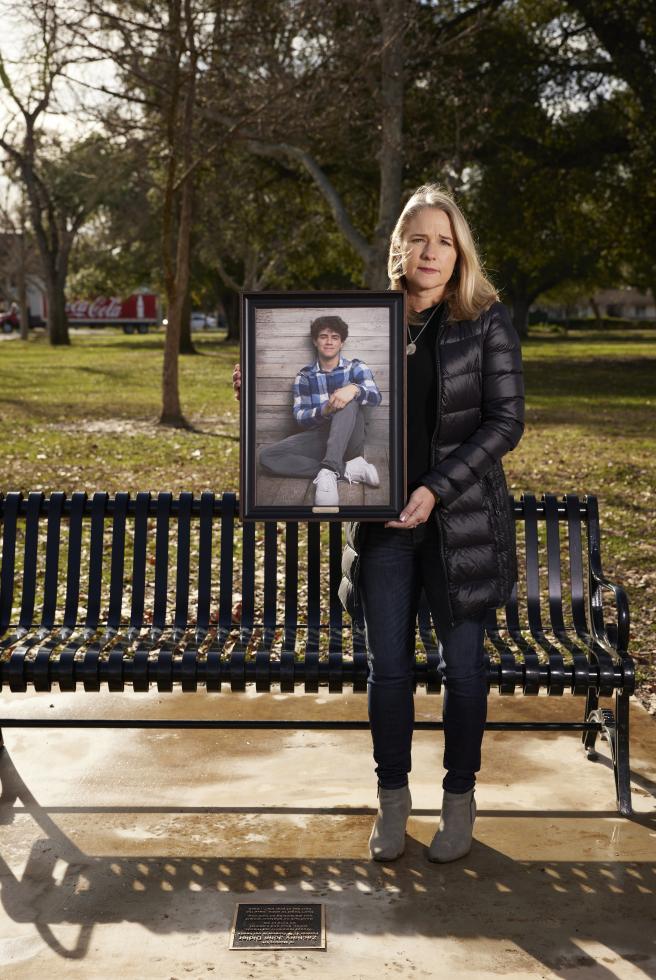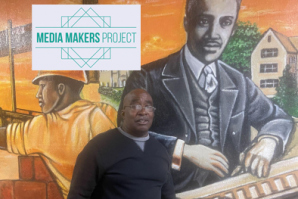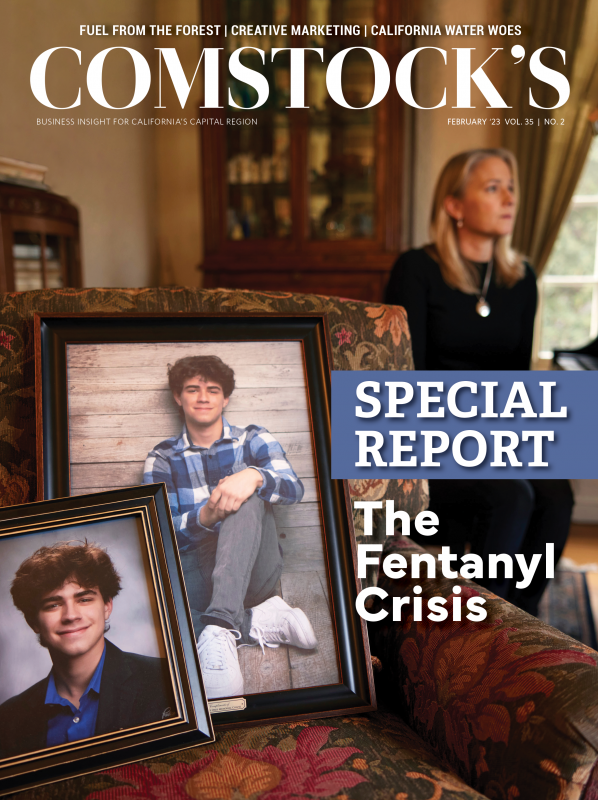Laura Didier looked around the auditorium at the middle school students, got up, grabbed the microphone and looked right at them. This is not what she expected to be doing with her life. A former jazz singer, real estate agent and small business administrator, she could not have envisioned herself going to schools in the Capital Region to talk to students about the dangers of fentanyl. It’s a sober but important role she took on after her 17-year-old son Zach, a straight-A student, aspiring Eagle Scout, athlete and musician who had the lead role in the school play, died of a fentanyl overdose two days after Christmas in 2020.
Laura Didier was shell-shocked. She had never heard of fentanyl. Now it’s her life’s mission to make other parents aware and warn other teenagers about its fatal dangers. “I was so blindsided because I never heard of the crisis. I never heard of the fake pills,” Didier says. “I was one of those parents who thought my kid’s on a great path.”
Fentanyl, an opioid 50-100 times stronger than morphine, according to the Drug Enforcement Agency, has a deadly grip on our region and our nation. It is now the No. 1 cause of death in the U.S. among adults aged 18-49, more than COVID-19, suicide and accidents. The DEA says two milligrams of the deadly powder, which is the size of four grains of salt, can be fatal, and it’s being used to illegally manufacture counterfeit pills of common prescription drugs such as Percocet and Xanax.
Zach was found unresponsive by his father, Chris, the morning of Dec. 27, 2020, slumped over his desk with his head on the keyboard. Frantic calls were made to 911 but Zach, a senior at Whitney High School in Rocklin, was pronounced dead at the scene. With no history of health problems or drug abuse, Placer County officials suspected a fentanyl overdose. Toxicological tests would confirm that two months later. Authorities also determined he bought a pill from a stranger on Snapchat thinking it was the painkiller drug Percocet. Instead, it was a fake pill loaded with deadly fentanyl.
Zach had no history of drug use. His parents were able to unlock his cell phone through the aid of his girlfriend, who knew his passcode. Authorities searched his messages and within days made an arrest of the man who sold him the tainted pills. Virgil Bordner, 22, was sentenced to 17 years in prison in September 2022 after pleading no contest to involuntary manslaughter, selling a controlled substance to a minor and a special allegation of inflicting great bodily harm.
Schools were still in lockdown at that time, so Laura Didier didn’t realize she was about to begin a crusade. It began when a friend asked her to speak to other parents in a socially distanced backyard gathering. Then she did a virtual town hall with the Granite Wellness Center in Placer County.
Laura Didier holds a portrait of her 17-year-old son, Zack, who
died of fentanyl poisoning in December 2020. A bench is dedicated
to Zach in Land Park.

“I started realizing how many parents were just like me, not knowing about those counterfeit pills and fentanyl. I just really wanted to be a voice in this, to share how this is happening and how it can happen to any family,” Didier says.
Now, with lockdown lifted, she’s spoken at about two dozen high school assemblies throughout the region. Teen deaths from fentanyl soared from 253 in 2019 to 884 in 2021. That number is expected to be higher in 2022.
“The students are amazing,” Didier says. “When you have a grieving parent, they’re talking about their child who died; they’re really listening. They are very locked in to what we’re saying.”
Didier, who choked up several times during the conversation, says she’s careful not to lecture the teenagers she speaks to. She tells them she cares about them and their lives.
“We’re saying, ‘Look, you guys need to know what’s out there. You need (to know) these are dangerous. No generation has had to face what you have to face with this. It’s not fair that you have to face the dangers. And it’s our job to inform you what’s going on.’” She now works for A Song for Charlie, an educational nonprofit about drug awareness launched after a Southern California couple, Ed and Mary Ternan, lost their 22-year-old son, Charlie, to a fentanyl overdose in May 2020.
As the fentanyl epidemic grows, more and more parents are mourning the death of a child. Rich Lee is unfortunately one of them. His 23-year-old son, Jake, who worked at Crepeville in Davis, died of fentanyl poisoning in April 2021. “He took a pill one night and it killed him,” Lee says. “I’ll never get over it. It just affects every day. It changes everything.”
Jake Lee was a quiet teen who liked books, but also enjoyed being the class clown. He struggled with depression, but took online courses at Arizona State, hoping maybe to be an English teacher. “It could be the best kid in the world who’s never touched anything. They hit a certain age and they’re at a party and (someone says) ‘Hey, try this. It will make you feel great.’ Any kid could take this pill … and you die.”
Lee wants to stress his son wasn’t a drug addict. He fears people think only drug addicts die of drug overdoses and won’t listen to the message about the astounding amount of fake pills, or fentapills, circulating in the Capital Region and throughout California and the U.S.
“This is why I do not say my son Jake died of a drug overdose because he was not overdosing on some drug he took too much of. He thought he was taking Percocet, which would not have killed him,” says Lee, adding he’s angry these fake pills are so readily available and could kill so easily.
Didier got a gift from Zach after his death. On his cellphone camera roll was a video of Zach beautifully playing the piano while his dog howled along. His mother had never seen it before. A few months later, she received a bittersweet letter in the mail: Zach’s acceptance letter from his dream college, UCLA.
Didier received grief counseling and PTSD treatment “for seeing my son in a body bag.” She already has several anti-drug assemblies planned for 2023. Lee found help by attending a conference put on by the Tim Griffith Foundation, which offers weekend retreats for parents who suffered the sudden loss of a child. Both Didier and Lee are grateful to county officials and law enforcement in Yolo, Placer and Sacramento counties for their fentanyl awareness campaigns, which include the “One Pill Can Kill” website, the Sacramento County Opioid Coalition and billboards along freeways. Sacramento State held a full-day conference on the opioid epidemic during its fall semester.
“The thing parents have to drill into their kids is don’t take pills, because it could very well have fentanyl and fentanyl can very well kill you,” Lee says. “And it is killing a lot of people — kids and adults.”
–
Stay up to date on business in the Capital Region: Subscribe to the Comstock’s newsletter today.
Recommended For You

Special Report: Fighting Fentanyl
Public health officials, lawmakers and law enforcement are fighting back against the highly-potent drug crisis in the Capital Region
The problem has been a sharp rise in the availability of illicit fentanyl, or fake pills, which has shown up in other drugs. The crisis comes when a user doesn’t know the pill they are taking is laced with a deadly dose of fentanyl.

The Herb Column: Cannabis Dispensaries vs. Opioid Overdoses
UC Davis professor Greta Hsu on her groundbreaking study about cannabis availability and opioid-related mortality
The study’s findings show that as the number of dispensaries increase, the number of opioid deaths drop.

Follow Her Lead: Olivia Kasirye
As the country celebrates the 100th anniversary of the 19th Amendment, we profile 19 leaders in the Capital Region
Olivia Kasirye, public health officer of Sacramento County, is often called on to be a stable figure at the center of a crisis.

Startup of the Month: Wyllness
Granite Bay startup launches solution to help solve the opioid crisis
The opioid crisis was born in the late 1990s. Pharmaceutical companies said opioids — a class of drugs that produce pleasurable effects and relieve pain — weren’t addicting. Healthcare providers prescribed more of them. Twenty years later, we’re in the throes of an epidemic.

Hooked on Fishing, Not on Violence
A reformed drug dealer mentors youth through fishing, music and willingness to listen
Poole takes boys and young men ages 5-24 from Sacramento out every Saturday morning not only to fish but to be mentored. He calls it “healing by the water.”

Perspective: The Ever-Growing Sacramento Homeless Crisis
The closure of a 20-year-long homeless services program left a hole in our chain of homeless services, writes Sherman Haggerty in a guest column for Comstock’s. The local shift to housing first and the elimination of transitional housing have contributed to the rapid growth of our homeless population, he argues.




